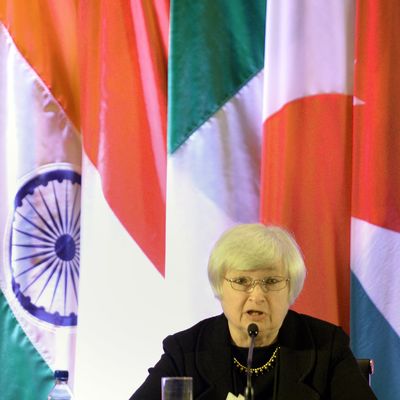
In a widely unexpected move, the Federal Reserve has decided not to “taper” its bond-buying programs until the economy improves some more (and also invalidate my thoughtful GIF compilation from this morning).
The no-taper decision is sending stocks to all-time highs, since Wall Street had anticipated a taper of at least $10 or $15 billion in monthly buying. But the bigger takeaway is that this is a sentient Fed — a Fed capable of setting its compass not simply by the data in front of it, but also by the stories it hears. Ben Bernanke was on solid logical footing when he proposed the taper last May; it has to end sometime, after all, and a housing recovery coupled with a falling headline unemployment rate had given him the cover to begin tightening. But progressive economists and consumer advocates objected loudly, on the grounds that the labor participation rate and wage stagnation meant that not all was well in the economy, despite appearances.
Another Fed, itching to stop abnormal stimulus and shrink the balance sheet, might have plugged its ears and dismissed these concerns. But this Fed listened.
Some will claim that today’s taperless announcement bodes well for Fed chair front-runner Janet Yellen, who has been the most outspoken Fed governor on the need to tie policy goals to real measures of economic health, such as participation rates, rather than simplistic headline numbers that can fail to capture the real state of the economy.
That’s probably true. But it also shows how widely influential doves like Yellen have been in reorienting the Fed’s priorities around helping to create jobs. Part of the reason today’s move shocked Wall Street is that this is a much different Fed from the one most traders are used to dealing with. It’s a more compassionate Fed, a more holistic Fed, and a Fed that sees its role as not only fulfilling the official mandate of price control and low unemployment, but as filling the gaps where legislators are failing. It’s also a political body, deeply aware that the fiscal shenanigans likely to occur in this fall’s debt-ceiling debate could undo months of its efforts to stabilize the economy. It’s the most subtle ideological transformation of a major monetary policy body in decades, but one of the most important. The Fed, with few exceptions, is all Yellens now.





























